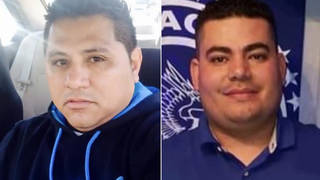
Related
Topics
Guests
- Claudia Palaciosracial and migrant justice activist and a U.S. Marines veteran. She was among seven people arrested on Friday after blocking traffic in New York City to protest the federal government’s new round of deportation raids against Central American families.
We speak with Claudia Palacios, a racial and migrant justice activist and a U.S. Marines veteran. Palacios was among seven people arrested on Friday after blocking traffic in New York City to protest the federal government’s new round of deportation raids against Central American families. She was born in Texas through the help of a midwife, rather than in a hospital, because her mother feared being deported. While the military recognized Palacios’ birth certificate, allowing her to serve for five years, including stints abroad, the State Department has refused to issue her a passport. “I’m basically stateless, because the U.S. does not recognize my birth certificate,” Palacios says.
Transcript
AMY GOODMAN: This is Democracy Now!, democracynow.org, The War and Peace Report. I’m Amy Goodman, with Juan González. We are spending the hour looking at the state of the union, not only the address, but the state of the union today. We’re joined by PBS broadcaster, journalist Tavis Smiley; his latest book, The Covenant with Black America–Ten Years Later. We’re also joined by CodePink co-founder Medea Benjamin, Alicia Garza of the Black Lives Matter movement, and Claudia Palacios, who is a military veteran and a migrant rights activist. Juan?
JUAN GONZÁLEZ: Well, Claudia, I’d like to ask you—about the only time last night when the president got applause from everyone in the chamber, Democrats and Republicans, was when he said that we have the strongest military in the history of the world. You are a military veteran. And could you talk about his legacy in terms of the military? And also, you’re—right now you’re facing a situation where you don’t even have a passport, even though you were born in the United States and you have served in the military. Could you talk about your personal experience?
CLAUDIA PALACIOS: Of course. So my family is indigenous brown people. We were forced to migrate into state-sanctioned United States. And then, there, from then, I was funneled into the military-industrial complex. And when I joined the military, I presented my vital records, right? Due to the fear of immigration communities of deportation, I was born through a midwife in the state of Texas. That birth certificate was recognized by the military in order for me to join the service. Once I was an active-duty servicemember, I applied with the Department of State for a passport, and they failed to recognize my birth certificate.
AMY GOODMAN: Wait, so you served in the military for five years.
CLAUDIA PALACIOS: Correct.
AMY GOODMAN: You were in Okinawa.
CLAUDIA PALACIOS: I served in the military. I served my first years in Okinawa, then in California, deployed from California to countless countries. I was able to travel with a military ID, which I was then stripped from once my end of service—once I ended my service. So now I am—I’m basically stateless, because the U.S. does not recognize my birth certificate. So, then, wait, I can’t leave my country. I haven’t seen my family.
AMY GOODMAN: You have something in common with Obama, when it comes to some people, right?
CLAUDIA PALACIOS: Correct.
AMY GOODMAN: Not recognizing his birth certificate.
CLAUDIA PALACIOS: Correct. So the fact—so the fact that he brings this veteran as an honored guest, I say it’s a mockery, because there’s a community of deported veterans. Like, this is not an isolated case.
AMY GOODMAN: But they have nowhere to deport you to. You were born here.
CLAUDIA PALACIOS: They have nowhere to deport me to, no.
JUAN GONZÁLEZ: And aren’t supposedly people who serve in the military, even if they are not citizens, even though you say you are, because you were born here—
CLAUDIA PALACIOS: Correct.
JUAN GONZÁLEZ: —eligible to be made citizens?
CLAUDIA PALACIOS: Right. But the issue now is, is that how could I be naturalized when I’m stateless? Because I was born in the United States, but I can’t naturalize myself if I do not come from anywhere else, correct? So, and—go ahead.
JUAN GONZÁLEZ: So, in terms of when you’re seeing the situation of how the military is being deployed around the world, by not only this president but so many others in the past, your concerns?
CLAUDIA PALACIOS: I mean, it’s completely unacceptable, you know, his foreign policies and just military occupation, in general. As a servicemember who was serving countless countries, like, the sentiment and the climate is the same. Local nationals do not want us there. You know, we’re destroying their land, we’re creating hostile environments, and all for military presence, all so that the—so that the U.S. empire can have more control over countries and enforce these neoliberal economic policies that then, again, cause migrations, cause wars and migrant communities to come here, just so they can be criminalized and then thrown into detention centers. So it’s this vicious cycle, you know? It mimics the prison-industrial complex the same way.












Media Options